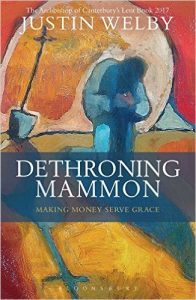Archbishop Justin on Money
 The Archbishop of Canterbury’s 2017 Lent book is Dethroning Mammon: Making Money Serve Grace. Archbishop Justin argues that Mammon, the idol of economics and finance, has distorted our valuation of people and things. The exchange value of a thing is so often a poor reflection of its worth.
The Archbishop of Canterbury’s 2017 Lent book is Dethroning Mammon: Making Money Serve Grace. Archbishop Justin argues that Mammon, the idol of economics and finance, has distorted our valuation of people and things. The exchange value of a thing is so often a poor reflection of its worth.If we could see with the eyes of Jesus, we would regard people as supremely precious, even those who are not useful or profitable–the aged, the disabled, the sick. Consider Lazarus (Jn 11), who was, perhaps, an invalid in the care of his two sisters. In Jesus’ eyes he is beloved, not at all forsaken; he is worthy of new life. Though the world might consign him to the scrapheap, God brings new life.
If we saw with new eyes, we might become rich even in our poverty. Welby tells of Cardinal Van Thuan, held prisoner in Vietnam after the Communists seized Hanoi in 1974. “While he was in prison,” he says,
“…every day he managed to celebrate mass, putting himself in communion with Christians around the world and with the living presence of Christ. Through he had no books, he celebrated using the liturgy that he had memorised over the years. Typically he took one grain of rice and a few drops of rice wine, offering them up in the palm of his hand. [He] found himself embraced every day by the generosity of God in a grain of rice and a mere taste of rice wine, unfolding the whole presence of the creator of the universe.”
God, who is the inexhaustible depth and resource of the creation, confounds all our commonplace valuations. If we learn to see, we can realise the “huge beauty in every person, and the infinite provision of God that can come through us.”
But how can we see like this? Let us simply begin the day by praying that we will see Jesus in everyone we meet; and let us pray to surrender “my control over what I want and what I do, my desire to ration my love rather than to let it flow out abundantly (because deep down I always fear it might run out).”
If we open ourselves up like this, we might be surprised.
A bad measuring line
Learning to see is hard for us, for we clouded by many illusions—especially, says Welby, by notions of measurement. Notoriously, if it’s not measured it tends not to be managed. People might have a tight control on measurable aspects of their lives—household budgets, salary, even use of time. Yet they might be “entirely unaware of the state of their relationships, the condition of their marriage, the happiness of their children.” These are immeasurable, intangible.
There are many goods the market cannot measure and does not value. Take, for instance, voluntary and unpaid work–not reckoned in the size of the economy. Yet Churchgoers in the UK alone, says Welby, contribute approximately 3.3 billion pounds per annum to the national economy by their volunteering. The parent “who stays at home or refuses a promotion to be with a child with disabilities is not considered to contribute.” The spouse “who supports their partner at the cost of their own career is seen as second-rate, or lacking ambition.”
Nor does the market value a commitment to the long-term future, the needs of which we cannot measure with precision: saving money, repaying debt, downsizing, incurring short-term costs for a long-term gain, taking care of the earth—all these are failures in the eyes of Mammon, who understands growth alone. I am reminded of what the Australian academic Clive Hamilton called our “growth fetish”. Anything else is ruled out of court.
We need to get onto the wavelength of intergenerational ethics. Welby says that this “is a key element of reflecting the nature of God, who sees all time and space in one glance.” The Old Testament is full of the consciousness of responsibility for future generations: God’s covenant with David (2 Samuel 7) is a covenant for all time. God’s promise to Abraham is that his descendants will be as many as the stars of the sky (Gen 15:5, 22:17, 26:4). Yet in our present idolatry we have lost “our sense of being part of the flow of the generations,” living only for the present, for tomorrow we die.
Learning to give, learning to serve
Mary anoints Jesus’ feet with costly ointment (Jn 12), inciting Judas’ anger. Judas, says Welby, represents the economy of Mammon—the economy of scarcity, of fear, of anxiety about control. Mary represents God’s economy. She “is not concerned with efficiency, or thrift, or measurement, or appearances. Mary embarrasses herself. She goes completely overboard.” She reflects the generosity of God who gives abundantly—the God who gave manna in the wilderness, and who gives “flesh” for the life of the world.
Mary offers adoration in her own way. Learning to see anew, and learning to give, must also begin for us in worship. That is how we shall be reoriented to God, away from idols. That is how we will get a sense of the common good, of belonging to one another, of holding our possessions on trust for others. We will be empowered to give with “an appropriate and extravagant generosity.” A family which worships will not, then, be inward-looking, but will be involved in the life of the whole community: family life will consist in “creating communities of celebration and abundance, in which the outsider, the alien and the stranger are welcomes and where they find healing, hope and company because of the self-giving of the family.”
Consider the next episode in John’s Gospel, the foot-washing (Jn 13)–a lesson in service. For Welby, “when the one to whom all power was given knelt down to wash feet, God reversed the world order. Jesus showed us that power in this world is not really what you think. It’s not money, or status, or beauty. True power lies in washing feet, in taking up the role of a servant.” We are mistaken, then, if we suppose that money or material possessions represent true status or true power. Power consists in supporting others, supporting the weak; we are lifted up if we lift others up.
Welby sees it like this:
“This ritual of foot-washing inspires us to take on the basest roles in society and to turn them into beautiful things. This is a superpower that all Christians have—to take something that no one else wants to do, and through Christ, turn it into a beautiful thing.”
And, more than this, when we share and when we serve, we gain. There is, like the loaves and fishes, a mysterious multiplication–for sharing is life’s essence. We become available to God, open to grace; we live into friendship and the common good. We recognise that life is not “a process of exchange and equivalence, but of abundance and generosity”. “Exchange and equivalence,” says Welby,
“is a zero-sum approach, the notion that what I give I lose to your gain. It implies a closed system. Abundance and generosity implies an open system, one in which the creative power of God is ever active, so what we give we gain.”
In a transactional society, sharing could be a revolutionary act. Transaction is about contracting, but sharing is about friendship and relationship–even beyond our conscious awareness. It “builds links with people whom we may not know and can never reach or meet in any other way.”
Let us learn to see money as an instrument for building relationships.
Dethroning Mammon
Welby concludes by reflecting on Revelation 18, the vision of the New Jerusalem, the City of God, which descends from heaven. God’s rule is established on earth: “it is a picture of the ultimate urban regeneration, in which the city that is full of sin is replaced by the city that is full of God.” Babylon is defeated–that “commercial hub of the world,” the destination of every trader.
How can we work to dethrone Mammon? We can learn to see. We can pay attention to the goodness and glory in all things. This will be for us a spiritual discipline, the fruit of prayer and self-reflection. And we can repent. Let us review our giving, review our spending, and review our valuation of money. Why do we desire it? How is it speaking to us? Are we chasing a false security?
And finally we can enthrone Christ: “enthrone Christ and be willing to let finance be transformed in your own life and that of family and home, and let God take care of Mammon.”
For reflection
Consider the groups, communities and institutions of which you are a member. In what way has their vision been affected by Mammon? How might you challenge that?
What aspects of your daily life can make your faith feel uncomfortable and risky? How could seeing things through God’s eyes help you?
Can you remember a time when God met you in a surprising or unexpected way? In who or what did God reveal himself to you?
Looking at your life, what gives you most joy and happiness? Of the things you value, which are tangible and which are more intangible? How balanced is the spread of your attention between them?
What habits or practices might you change if you were to value intergenerational ethics more highly?
What examples come to mind for you of situations where the shout of Mammon drowns out or masks the things that really matter?
What does the world consider useless? What value might God see in those things?
On what things might God be calling you to loosen your grip? What ‘dethroned habits’ have you witnessed in others? How would these actions make a difference to you and those around you?
How were possessions and power treated in your family of origin? How do you treat them now and how do you account for the difference, if any?
To what simple, everyday habits of foot-washing might God be calling you?
Are there relationships in your own life that would benefit from being built on abundance and grace, rather than exchange and equivalence?
What aspects of community life are you thankful for? What aspects are you passionate about maintaining? Or adding? Which aspects of community restrict our flourishing? How might Mammon be dethroned in those parts of the community?

